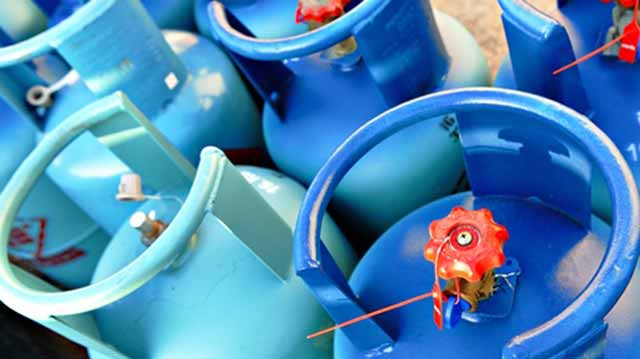With more Nigerians embracing Liquefied Petroleum Gas (LPG) for domestic cooking, some traders are making brisk business by importing used gas cylinders into the country.
That a greater number of Nigerians have opted for clean energy due to health and environmental implications. World Health Organisation (WHO) revealed that smoke emanating from firewood used for cooking is the third greatest killer of women and children in Nigeria, resulting to 93,300 deaths, yearly.
Experts say cleaner energy and fuels have the potential to reduce deaths from smoke-related illnesses, mitigate climate change and lower air pollution. Statistics have also shown that about 60 per cent of Nigerians use firewood, 30 per cent utilise kerosene, while five per cent cook with charcoal.
However, the shift to LPG has doubled demand for gas cylinders. Currently, the percentage of Nigerians using domestic gas have grown above five per cent and triggered importation of second hand cylinders to meet the gap in the market.
That many second hand cylinders find their way into the country due to lack of proper scrutiny at the ports. Cases abound of an impounded forty-foot containers loaded with substandard second-hand cylinders at Apapa Port, Lagos.
The goods were disguised during importation as used bicycles, television sets and toys, according to the Standards Organisation of Nigeria (SON).
The attraction for buyers of the second-hand cylinders had been linked to its low cost, which is half the price of the new ones. The business for second hand cylinders is booming, as many Nigerians are unaware of the dangers and safety measures associated with it.
Dealers attribute the quest to own second hand cylinders to the exchange rate, which almost double the price of imported new cylinders. It was further gathered that demand for three, five and six kilogramme cylinders has risen for most imported ones.
Consequently, the impact is already being felt in some cities. Charles Obidigwe and eight members of his family died in their Lagos home from a cooking-gas cylinder explosion. Another incident occurred recently, when three persons, including a gas attendant at the gas shop died from a gas cylinder explosion. There are also other unreported cases.
MEANWHILE, the government had stopped customers’ ownership of cylinders as well as barred the refilling of gas cylinders by the roadsides and other unauthorised places. The policy requires that the ownership of LPG cylinders rest solely with the dealers and distributors. The policy is yet to make impact on Nigerians.
The Federal Government through the Office of the Vice President also launched a National LPG Expansion Implementation Plan five years ago, which encouraged an exchange programme, after reports revealed that about 90 per cent of cooking gas cylinders had expired.
Under the scheme, gas cylinder users could bring their cylinders, wherein a safety check would be conducted on the cylinders; and cylinders that have expired be swapped for new ones. But not much has been heard on the gains of the policy.
Local manufacturers are already overwhelmed by the demand in the markets and groaning under some unfavourable government policies. The development has reduced investors into the manufacturing of cylinders in Nigeria. Notable oil companies that were used to selling cylinders and gas have wind up such businesses.
Experts say cylinders typically outlive their validity after 15 years, but most domestic gas cylinders in circulation are over 30 years old, making it dangerous for use.
An Associate professor of Climate Change and Environmental Education, Lagos State University, Michael Ahove, said the menace of second hand goods has moved from cars to household appliances, stressing that it is an evidence of degeneration in the economy.
He said second hand gas cylinders, which are often imported, are not designed for Nigerian environment, as the standard in Europe is different from that in Nigeria, hence, the durability and safety are questionable.
Ahove explained that the environmental dangers of importing second hand gas cylinders goes beyond the disaster of explosion as the iron casing don’t last long in most of Nigerian homes.
He said that the problem could be worse than plastic pollution crisis, if not checked. It could increase the iron content in the environment where they were dumped.
Ahove stated that the challenge remains regulators that should strengthen their monitoring of the border posts; land and sea as well as ensuring second hand gas cylinders don’t find their way into the country.
Chemist, researcher and environmental consultant, Prof. Babajide Alo, said the influx of gas cylinders would be dangerous for both health and safety of human beings as well as the environment.
Alo, who is the former Deputy Vice Chancellor (Academics and Research) and Director, Centre for Environmental Human Resources Development (CENHURD), University of Lagos, said second hand cylinders could easily explode and shouldn’t be allowed in the country, however cheap they maybe.
Alo urged the public to be wary of expiring dates on domestic gas cylinders, to avert dangers to life and environment. “Expired cylinder can explode once the expiration elapses. Each gas cylinder expiring date is coded on the cylinder in alphabetical order,” he said.
An official of SON, Mr. Bola Fashina, told The Guardian that second-hand gas cylinders in the first instance, are not supposed to come into the country, stressing they are contraband.
Fashina, who is SON’s Head of Public Relations said, “We had at different times apprehended many importers through information and prosecuting them. We have some cases ongoing in courts.
He admitted that the agency is part of the Federal Government’s gas cylinder exchange project. “We are only a part of the team that is going to work on the project. The standard allows for cylinders to last for 15 years, but within those years, it is to be pre-certified every five years. We are involved in ensuring that the standard is maintained,” he said.

